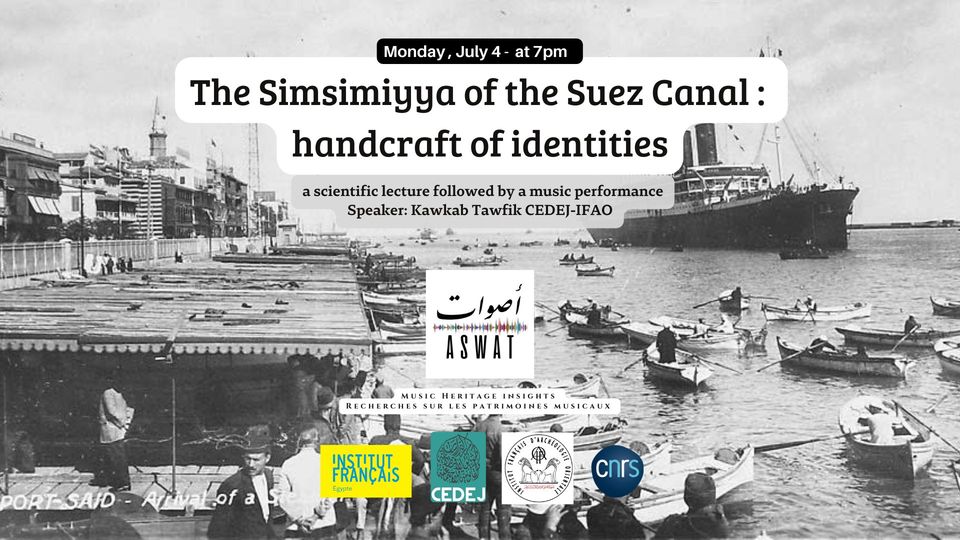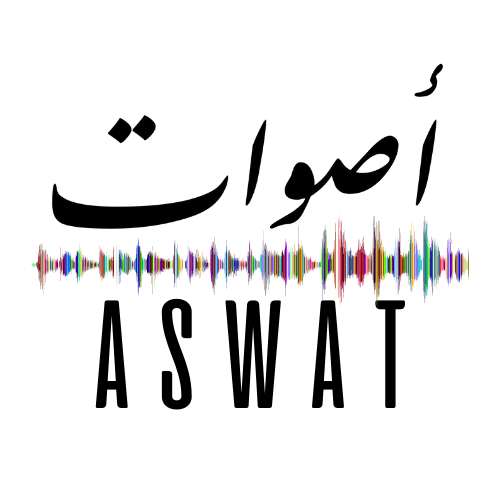Manifestations scientifiques
Abonnez-vous à la … Subscribe to the Mailing list :

ASWAT
Le lundi 4 juillet 2022 à 19h00 (heure du Caire), IFAO 
The Simsimiyya of the Suez Canal : handcraft of identities
Kawkab Tawfik
Partenaire(s) de l’Ifao : CEDEJ & IFE
Langue : anglais.
Originally pentachordic, the simsimiyya sees its organological development in parallel to a process of acquisition of meaning and identity connotation mong the communities of the cities of the Suez Canal. The simsimiyya arrived in this area through different waves and routes of migration, mainly in the XIX century by Nubian, Sudanese and Upper Egyptian workers during the digging of the Suez Canal. Its organological development and
the change in its musical forms are the result of complex socio-cultural onditions through which the role of the simsimiyya player changed, from the events of the Canal from the 1950s onwards. In fact, from a simple instrument played by workers and fishermen in harbor cafes, the simsimiyya was elevated to an instrument of popular and anti-colonial resistance with the 1956 and 1967 wars. It started to be played outside its original environment becoming suddenly a stage instrument. It gradually enriched its repertoire by adding elements of the urban music tradition and, in this way, the simsimiyya elevated its status to an instrument of the ālāt al-ṭarab and developed different sound outcomes, based on the geographical and social space in which it was played. Today the
sismimiyya acts as a social bond in various dynamics and it is a symbol of identity pride among the communities of the Suez Canal.
About the musicians:
El Tanbura is a collective of veteran Egyptian musicians, singers, fishermen and workers based in Port Said,
belonging to the El Mastaba Center for Egyptian Folk Music. Since more than twenty yearsthey perform regularly on a weekly base in Port Said and are engaged in the transmission of the Suez Canal music heritage to the new generations. The ensemble is leaded by Mohsen al-Ashly, considered today the master of the simsimiyya in the
Canal.
The speaker:
Kawkab Tawfik is postdoctoral fellow at IFAO-CEDEJ. She obtained a PhD in Cultural Heritage (2020) at University of Rome “Tor Vergata” with the thesis: Music, Politics and Identity in Egypt post 2011; in her research
she applied an ethnographic methodology focused on the historical and social dynamics related to the simsimiyya lyre of the Suez Canal.

ASWAT
Sounds - and music - are able to shape individual and collective identities, define spaces and borders, denote cultures, transmit knowledge and influence style lives.
ASWAT is a series of music meetings and music performances focusing on Egyptian culture(s) of music that seeks to explore a range of musical practices across Egypt, and beyond, through the contribution of academic speakers and music makers, followed by a concert. The meetings will offer the opportunity to deepen some historical, religious, social and musicological aspects that interwoven in, and from, the Egyptian music heritage, addressing creation, performance and reception practice.
Aswat is a joint initiative from CEDEJ, IFAO supported by IFE.
Les sons - et la musique - sont capables de façonner les identités individuelles et collectives, de définir les espaces et les frontières, de dénoter les cultures, de transmettre les connaissances et d'influencer les styles de vies.
ASWAT est une série de rencontres et de spectacles musicaux axés sur la ou les cultures musicales égyptiennes qui vise à explorer un éventail de pratiques musicales à travers l'Égypte, et au-delà, grâce à la contribution de conférenciers universitaires et de musiciens, suivie d'un concert. Les rencontres seront l'occasion d'approfondir certains aspects historiques, religieux, sociaux et musicologiques qui s'entremêlent dans et à partir du patrimoine musical égyptien, en abordant les pratiques de création, d'interprétation et de réception.
ASWAT est une initiative conjointe du CEDEJ et de l'Ifao soutenue par l'IFE.


